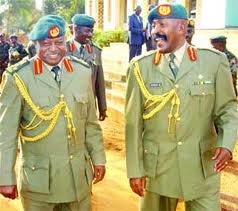Stop civilian trials in military courts, govt told
By John Stephen Katende
1st Aug 2011:
If the Ugandan military is to live up to its much-proclaimed professionalism, it should abandon subjecting civilians to a military jurisdiction, which is a stark violation of professionalism and international law. “…The military needs to take clear and concrete steps to redress the past decade of unlawful prosecution and convictions of civilians”, said Maria Burnett, Senior Africa Researcher with Human Rights Watch.
The Ugandan government should stop prosecuting civilians in unfair military courts, effective immediately, Human Rights Watch said in a report released last week. Military and civilian prosecutors should work together to resolve pending cases through release or appropriate retrial in civilian courts, and police should stop sending civilians to military custody, Human Rights Watch said.
The 27-page report, “Righting Military Injustice: Addressing Uganda’s Unlawful Prosecutions of Civilians in Military Courts,” documents the pattern of trials of civilians before military courts, the ways in which such trials violate international legal principles, and the steps Uganda should take to address these fair-trial violations.
Since 2002, military courts in Uganda have prosecuted over 1,000 civilians on charges under the criminal code, such as murder and armed robbery. A 2006 Ugandan Constitutional Court ruling, upheld on appeal in 2009 before the Supreme Court and consistent with international law, that military courts are not competent to try civilians accused of common crimes has not been enforced.
“…Prosecuting civilians in military courts may have been a matter of convenience and expediency for President Yoweri Museveni’s government. But it is unjust and unlawful under both Uganda’s constitution and international and African human rights law,” said Burnett.
At least 341 cases involving civilians are awaiting trial or judgment before military courts. Over the years, Museveni has repeatedly defended the prosecution of civilians by military courts, despite the Constitutional Court ruling.
Ugandan military authorities have indicated that they are contemplating amending the practice of prosecuting civilians, but no clear decision has been made about how to address this deeply entrenched system of rights violations. There is no mechanism in place to remedy the situation for the hundreds of civilians already serving prison sentences as a result of unfair military trials.
The prosecution of civilians before military courts violates human rights standards in a number of ways. Military courts do not meet the requirements of competence, independence, and impartiality under international law to try civilians.
Cases before the military courts fail to respect fundamental fair trial rights, such as the right to present a defense, the right against self-incrimination, and the prohibition on the use of evidence procured by torture. These rights violations are magnified in cases in which the death penalty is imposed. Ugandan military courts have sentenced civilians to severe penalties, including death sentences.
For example, in September 2010, 20-year-old Judith Koryang was sentenced to death for killing her husband, a member of the Ugandan military. She contended that she was abused by her husband and that he had threatened to force her from their home after she tested positive for HIV.
She pleaded guilty and was represented by a military defense lawyer, who did not raise a legal objection that the military courts were not competent to hear the case. The military court said the death penalty “…should serve as an example to all women married to soldiers to desist from plotting to kill their husbands over petty issues.”
In addition to halting all pending cases, Uganda should meet its legal obligations to remedy the situation for civilians serving prison terms handed down by military courts, Human Rights Watch said. To carry out these steps efficiently and effectively, military and civilian prosecutors should collaborate to identify all military court cases involving civilians and provide a remedy for each defendant.
“…Uganda needs to set up a review process for all cases involving the wrongful detention and prosecution of civilians before military courts and make sure each defendant has access to an effective remedy. This problem will not just go away. The government should provide for release or retrial in accordance with international fair trial standards”, Burnett said.
All out efforts to get a comment from UPDF Spokesman Lt. Col. Felix Kulaigye were futile by press time. END. Please login to www.ugandacorrespondent.com every Monday to read our top stories and anytime mid-week for our news updates.
![]()


